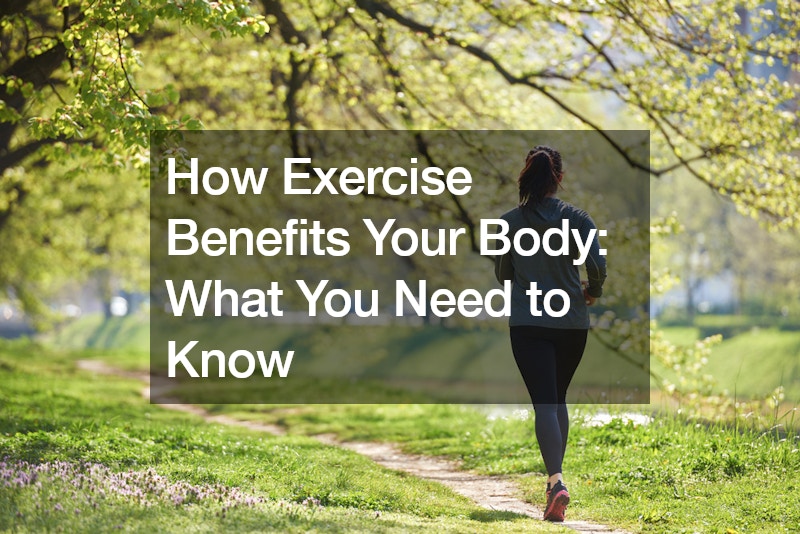In today’s fast-paced world, prioritizing physical activity is more important than ever. The benefits of exercise extend far beyond just physical fitness; they encompass mental well-being, emotional resilience, and overall health. Whether you’re a fitness enthusiast or someone just beginning their journey towards a healthier lifestyle, understanding how exercise impacts your body is crucial. In this comprehensive guide, we’ll explore the myriad ways in which exercise benefits your body and why it’s essential for overall well-being.
1. Improved Physical Health
Regular exercise is key to maintaining good physical health. It strengthens the cardiovascular system, reducing the risk of heart disease, stroke, and high blood pressure.
Exercise also helps to maintain a healthy weight by burning calories and building lean muscle mass. Additionally, it supports bone health, reducing the risk of osteoporosis and fractures, especially as we age.
2. Enhanced Mental Well-being
Exercise has profound effects on mental health, promoting feelings of happiness and well-being. Physical activity triggers the release of endorphins, neurotransmitters that act as natural painkillers and mood elevators. This “runner’s high” can boost mood, reduce stress, and alleviate symptoms of anxiety and depression. Regular exercise has even been linked to improved cognitive function and reduced risk of neurodegenerative diseases like Alzheimer’s.
3. Increased Energy Levels
Contrary to popular belief, exercise doesn’t drain energy; it generates it. Engaging in physical activity increases blood flow and oxygen delivery to the muscles, enhancing endurance and reducing fatigue. Over time, regular exercise can lead to greater stamina and resilience, allowing you to tackle daily tasks with vigor and vitality.
4. Better Sleep Quality
Exercise plays a crucial role in regulating sleep patterns and improving sleep quality. Physical activity helps to reduce insomnia and promote deeper, more restorative sleep. By expending energy during the day, you’re more likely to feel tired and ready for sleep at night. Just be sure to avoid vigorous exercise too close to bedtime, as it may interfere with sleep onset.
5. Enhanced Immune Function
Regular exercise strengthens the immune system, making you less susceptible to illness and infection. Physical activity increases the production of white blood cells, which are essential for fighting off pathogens and foreign invaders. By bolstering your body’s defenses, exercise helps to keep you healthy and resilient, even in the face of seasonal colds and flu.
6. Reduced Risk of Chronic Disease
Exercise is one of the most effective ways to reduce the risk of chronic diseases such as type 2 diabetes, cancer, and metabolic syndrome. Physical activity improves insulin sensitivity, regulates blood sugar levels, and reduces inflammation, all of which are key factors in preventing and managing chronic conditions. By incorporating exercise into your daily routine, you can significantly lower your risk of developing these life-threatening diseases.
7. Improved Self-esteem and Confidence
Regular exercise can boost self-esteem and confidence by enhancing physical appearance, increasing feelings of accomplishment, and fostering a sense of mastery and control. Achieving fitness goals, whether it’s running a marathon or mastering a new yoga pose, can instill a sense of pride and self-worth. Additionally, the social aspect of exercise, such as participating in group fitness classes or team sports, provides opportunities for social interaction and support, further bolstering self-esteem.
8. Enhanced Brain Function
Exercise has profound effects on brain health and cognitive function. Physical activity increases blood flow to the brain, delivering oxygen and nutrients essential for optimal brain function. It also stimulates the production of neurotrophic factors, proteins that promote the growth and development of brain cells. As a result, exercise can improve memory, concentration, and overall cognitive performance, making you sharper and more focused in both work and daily life.
9. Tailored Guidance from Personal Instructors
For those new to exercise or seeking to optimize their fitness routine, working with a personal instructor can provide valuable guidance and support. A qualified instructor can help you set realistic goals, develop a personalized workout plan, and ensure proper form and technique to prevent injury. With their expertise and encouragement, you can maximize the benefits of exercise and achieve your fitness objectives more efficiently.
The Psychological Benefits of Exercise
Exercise is not only beneficial for physical health but also plays a crucial role in promoting psychological well-being. Engaging in regular physical activity has been linked to a multitude of mental health benefits, ranging from stress reduction to improved mood regulation. Here’s a closer look at the psychological advantages of exercise:
Stress Reduction: Physical activity has long been recognized as a powerful stress reliever. When you exercise, your body releases endorphins, neurotransmitters that act as natural painkillers and mood elevators. These endorphins help alleviate feelings of stress and tension, leaving you feeling more relaxed and at ease.
Anxiety Management: Exercise has been shown to be an effective strategy for managing anxiety symptoms. By engaging in physical activity, you can reduce the levels of stress hormones in your body, such as cortisol and adrenaline, which are often elevated during periods of anxiety. Additionally, exercise provides a distraction from worrisome thoughts and promotes a sense of control and mastery over one’s body.
In conclusion, exercise is a powerful tool for improving physical, mental, and emotional well-being. From reducing the risk of chronic disease to enhancing mood and cognitive function, the benefits of exercise are undeniable. By incorporating regular physical activity into your lifestyle and seeking guidance from qualified professionals, you can unlock the full potential of your body and enjoy a happier, healthier life.
.


